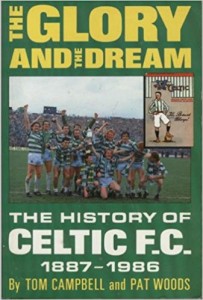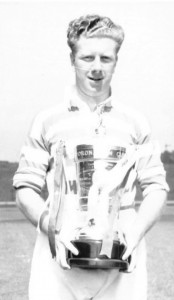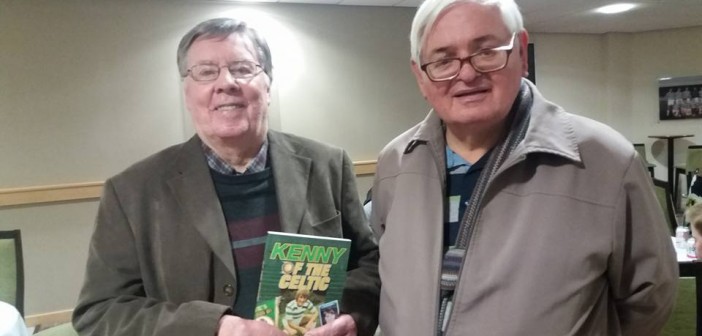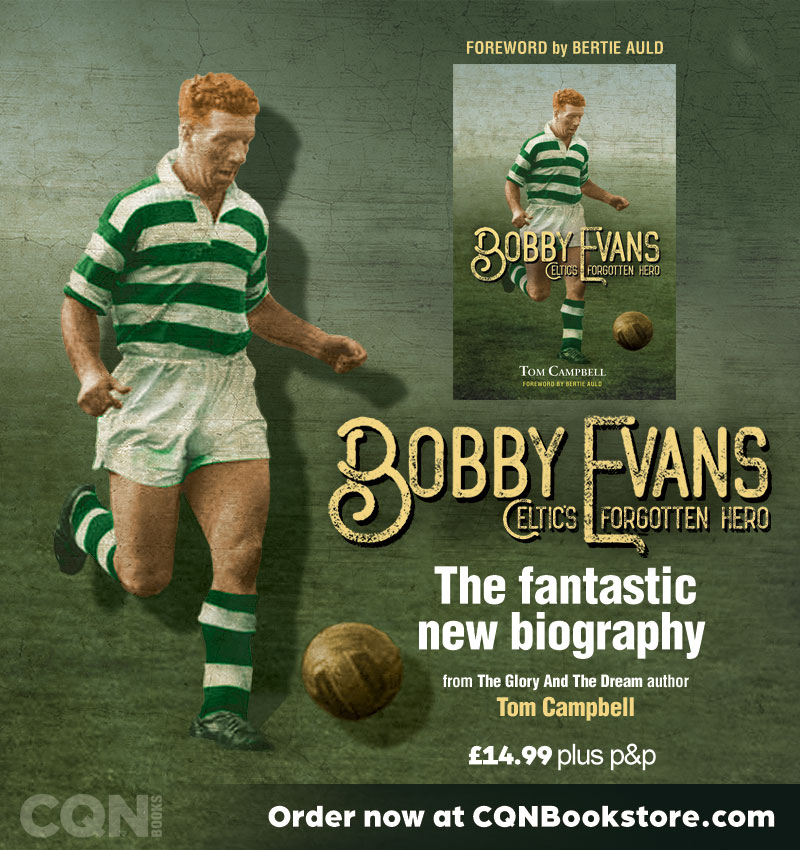CQN today announced the release of Tom Campbell’s thirteenth Celtic book. ‘BOBBY EVANS: CELTIC’S FORGOTTEN HERO’ is the long-awaited return of a Celtic author, who is widely regarded as the finest in his field.
The Glory & the Dream – the 38,000-selling unofficial history of the club – was co-written by Tom and Pat Woods, and it is perhaps the finest book ever written on Celtic Football Club.
Paul John Dykes caught up with Tom to find out more about the Ottawa-based historian:
Where did your love of Celtic come from? Was it passed down to you from your father?
“I can remember being a Celtic supporter in Primary School. My grandfather was a keen supporter, as were my cousins; my father less so.”
What are your earliest memories of watching Celtic?
“A New Year’s Day game at Ibrox in 1943 when we lost 8-1. Trudging home in the rain, my grandfather rationalised the defeat: the two Celtic players ordered off were victims of shocking decisions, Miller was fouled for the third goal, the seventh goal was offside… Even at a tender age I was slightly dubious; however, years later, research by Pat Woods and myself suggested my grandfather was right.
What types of Celtic songs can you remember from the terraces back then?
“Not too many, actually. I remember round about March 17th the supporters used to sing ‘Hail Glorious St Patrick’. Incidentally, years later, when Celtic beat Rangers in a Scottish Cup tie on St Patrick’s Day that generation of supporters were singing ‘Happy Birthday, St Patrick’. I suppose that’s one indication of the decline in religion in people’s lives.”
With so many talented individuals in the 1950s, why were Celtic only sporadically successful during that decade?
“A fatal combination of a ‘weak manager’ and ‘an interfering chairman’. Jimmy McGrory was just too nice to be a hard-nosed manager, and Bob Kelly felt watching Celtic every week made him an expert, especially in team selection.”
How was Jock Stein able to transform the team he inherited in the mid-1960s into the European champions?
“First of all, force of personality combined with a real knowledge of the game – and a ferocious work-ethic. It helped that Celtic were desperate for genuine leadership, and that he had coached several of the players there years before.”
Where were you the day that Celtic won the European Cup?
“Doing my best to concentrate on teaching English to a class obviously wondering why I was so distracted. The phone in the class rang, and the vice-principal intoned, “Inter Milan won…” I hung up on him utterly dejected, and the phone rang seconds later. “I hadn’t finished, and Celtic two.” He told me later he was worried I would jump out of the third-storey window, if he hadn’t phoned back.”
What do you miss most about the football of your youth?
“I don’t miss that much. After all, I have those memories: standing on the terracings, getting soaking wet (and not caring), walking miles to the city centre, rejoicing in famous victories.
I sense that supporters were more attentive then. There was no football on television; so, you had to pay attention or you would miss things. Nowadays, you can relax more, knowing there’ll be endless re-runs on television.”
What prompted you to write your first Celtic book? How did you approach the research, writing, and publishing process from Canada?
“A longish story, but here goes… I hurt my knee skiing and was off school for three days; my Canadian wife was a librarian and knew I was interested in ‘soccer’; so, she borrowed a couple of books from the library for me. I devoured them, and she asked if I had enjoyed them. I said something like: ‘Very much, but there were lots of mistakes. This game was at Hampden, not Ibrox… that was a free-kick and not a penalty etc.’ She was a bit miffed, and said something like: ‘Well, if you know so much about it, why don’t you write a book yourself?’
“The book was Glasgow Celtic (1945-1970). I used to have an excellent memory, and had seen a lot of those games and remembered them… I found out that the National Library in Ottawa (where I lived) had micro-film collections of The Glasgow Herald and The Scotsman and they were most helpful. They provided a little room, with a machine, and put aside the rolls of film I asked for; I used to go along every night about 8 o’clock and work there til midnight. It would take about three such nights to take notes on each season. The writing took place usually at the week-end and I found that much easier. When I finished it, I didn’t quite know what to do with it.
“Eventually, I plucked up enough courage to write to Cyril Horne of The Glasgow Herald and he volunteered to read it, and give me his thoughts. He also told me that Celtic would be on tour in Canada, and that I should drop in and see Jock Stein. Cyril offered to tell Jock that I’d go along to meet him, and that the Celtic boss would be very happy to deliver the manuscript back to Scotland in person.
“It all worked out; Jock Stein saw me, spoke for about an hour, explained various formations very patiently to me, and (as Cyril Horne had said) was pleased to deliver the manuscript: ‘No bother at all, son’. I was very impressed with the Big Man, especially as he must have still been reeling after losing to Feyenoord in Milan about a week before!
“I met up with Cyril Horne in Glasgow in July during the school holidays, and found him a delightful character; he was the Chief Football Writer for The Glasgow Herald, an Elder in the Church of Scotland – and the only journalist in Scotland who regularly took Rangers to task for their sectarian policies and over-physical approach. He put me at ease right away when we met up at Vesuvio’s Restaurant: ‘Before you ask, let me tell you that I read the manuscript thoroughly and I have to say this is the best book I’ve ever read about Scottish football. Living in Canada, how did you do it?’ I have to admit I was surprised; my wife, I think, was astonished.
“Why Vesuvio’s? I think there was a reason for that. I mentioned to Cyril that I had still not come to terms with Celtic’s success and that I was still scarred with numerous defeats inflicted by Rangers over the years. He surprised me: ‘If Celtic were to play Rangers in any other city than Glasgow, any European city, they would win regularly by 3-0… but here’s somebody who can answer that.’ Guess who had just come in? ‘John, I was just telling Tom here that Celtic would beat Rangers by three clear goals if you played them anywhere else but Glasgow.’ Jock Stein smiled, rubbed his chin thoughtfully, shook his head and said: ‘No Cyril, I don’t think so. It would only be 2-0’.
“How well received was your debut?
“It was astonishingly well received, and sold out two editions very quickly.”
How did you meet Pat Woods, and how did your first collaboration materialize?
“Some years afterwards I was back in Glasgow on holiday and at the airport going back to Canada I bought a wonderful little book by Bob Crampsey called ‘The Scottish Footballer’. I read it cover to cover, and spotted that Bob was headmaster of St Ambrose, and I wrote to him. Bob wrote back, thanking me for my comments and asking if I were the same Tom Campbell who had written Glasgow Celtic and, if so, could he pass on my address to Pat Woods who had also liked the book. The rest is history; in fact, more than one history.
“The gap between your first and second books was quite substantial. Was there any specific reason for that?
“I rather thought that one book was enough. I was married and had a family; I was teaching and had been promoted… However, Celtic’s centenary was coming up in a couple of years and I wrote to the club and offered to write it (the official history). I think that, two years before the event, Celtic had not thought too much about it. Well, they declined my offer and I wrote to Pat Woods about it; he thought I should still write it, and volunteered his help in the research. Encouraged, I started the book and Pat started to send me stuff, tons of stuff… and brilliant stuff. There was no way I could use this material without acknowledging it in more than the usual way. So, I suggested to Pat that we do the book as co-authors. Pat was a bit reluctant; he’s very modest, and shy, and he needed encouragement from me before agreeing. Incidentally, the title was his idea – and, in view of the club’s early history, entirely apt: Where has it fled, the visionary gleam? Where is it now the glory and the dream?”
Tell me more about The Glory & the Dream. How did you approach the process, how did the club help or otherwise, and how well received was the book?
“The Glory & the Dream was a genuine collaboration. You could say that Pat did the research, and I did the writing… but that’s not entirely accurate. Often, I would recollect certain incidents or references and Pat would be on the trail like Sherlock Holmes and fill in the specific details, and frequently Pat would spot what he called ‘Americanisms’ in my writing and hasten to correct them. How does it feel to now know that The Glory & the Dream is widely regarded as the greatest history ever written about the club?
How does it feel to now know that The Glory & the Dream is widely regarded as the greatest history ever written about the club?
“In a recent visit (November 2016) I attended a book launch at Celtic Park, and was genuinely touched by the comments of so many. About a year ago I had some health issues, and I appreciated the best wishes of so many of my peers.”

When did you decide to write the biography of Bobby Evans, and how has the process progressed to the point of release?
“Bobby Evans has always been a particular hero of mine, and I had often wondered at the lack of recognition he has received. I started writing segments of the biography about three years ago. If you are interested in the process, sometimes I don’t work chronologically (from the beginning to the end, as it happened). Instead, frequently, I treat a book like a jigsaw puzzle and do various sections as much as I can… and then at a later date join them all up. That’s what I did with this book: I started with his brief wartime period with St Anthony’s… and then went into the scandal he endured at the time he joined Chelsea in 1960… and then his squabble with the SFA round about 1950. After that, I was able to get back to a chronological order more or less. I should say that once again I got a lot of help (and material) from Pat at different times and had to go back and forth to insert that seamlessly if possible. Too often football biographies are merely a recounting of the highlights of famous players’ careers, complete with well-rehearsed anecdotes. I think that they deserve a bit more than that, and also (with my own advancing years) I’m aware that many readers are not old enough to remember the times or conditions Bobby Evans played in. So, there was an obligation, I felt, to attempt to provide a background for Bobby’s story.”
What are the main differences between the world of publishing now, compared to when you released your first book?
“The first book I wrote back in 1969 was written by hand, and I remember that one of my classes was Business English, consisting of fifteen young ladies all aged eighteen. They knew more about Business English than I did, and had few problems with grammar. So, I suggested tentatively they might like to type out my handwritten manuscript. They were delighted to do this to improve their typing, and were paid by having a pizza party at the end of the project.
“I’ve always been impressed with the typesetters the various publishers have provided. At Mainstream in particular there was a lady named Judy Diamond who acted as a self-appointed editor (and was invariably right to do so); she could point out when we had repeated an anecdote (or even a phrase).
“I suppose personal computers have speeded up the process considerably but in the old days there was probably more thought put into writing things out by hand.”
What other projects are you currently involved in?
“I’ve completed two novels and they’re sitting on the shelf awaiting further revision. I’m actually quite pleased with them. One is a murder mystery, set in Canada and the other might interest you more. It’s a speculative novel with the premise that Matt Busby actually played as a guest player for Celtic during World War II and later became their manager. It’s a blend of fact and fiction; well, I’m pleased with it.”
If you were to name a Celtic team made up of the finest players you have witnessed, who would make your greatest XI?
“An all-time Celtic team that I’ve seen? Almost impossible but here goes…
Goalkeepers: Willie Miller and Artur Boruc;
Right-backs: Danny McGrain and Didier Agathe;
Left-backs: Tommy Gemmell and Danny McGrain;
Central defenders: Billy McNeill, Marc Rieper, Alan Stubbs and Johan Mjallby;
Sweepers: John Clark, Neil Lennon and Paul Lambert;
Right-half or Midfield: Bobby Evans and Bobby Murdoch;
Left-half or Midfield: Bertie Peacock and Lubomir Moravcik;
Right-wing: Jimmy Delaney and Jimmy Johnstone;
Centre-forward: Joe McBride and Henrik Larsson;
Left-wing: Bobby Lennox and Charlie Tully.
Final Selection:
Miller, McGrain, McNeill, Mjallby, Gemmell, Evans, Lennon, Moravcik, Delaney, Larsson & Lennox.
That’s an almost impossible task.”
How do you watch Celtic these days?
“Usually at the James Street Pub along with the other members of the Ottawa CSC. It can be a chore in mid-winter, getting up at 6 a.m. with temperatures of -20 degrees outside and snow-bound streets… but it’s worth it.
“In all your years of watching Celtic, how does the current manager and team compare?”
“This is a wonderful season so far, despite a couple of blips in Europe. The manager seems to have everything in hand and knows what he’s doing; the players are co-operating. So, everything is going well.
“To be honest, it’s almost too easy domestically (and that doesn’t mean we’re going to get through the season undefeated). I would love to get a treble but you never know in cup football.”
Bobby Evans – Celtic’s Forgotten Hero by Tom Campbell is available to order now for only £10 plus p&p from CQNBookstore.com


